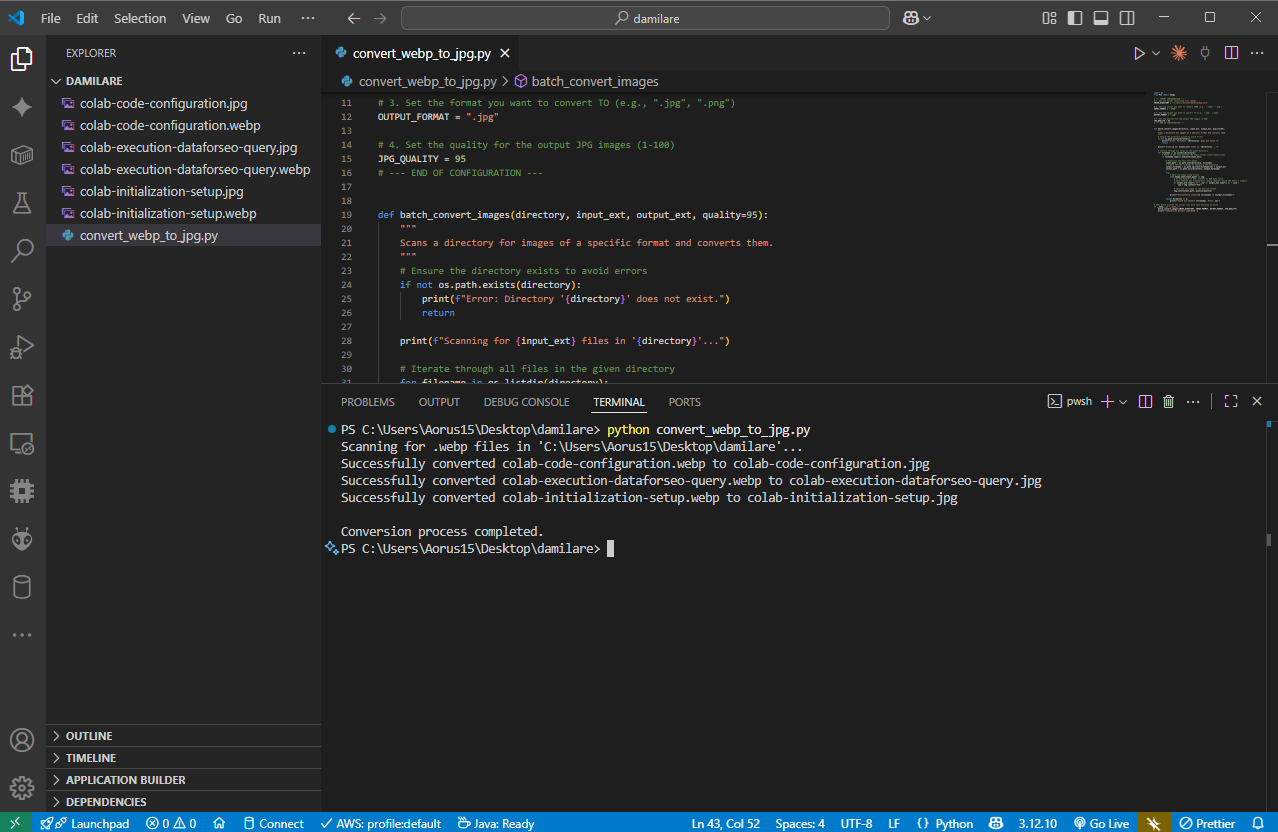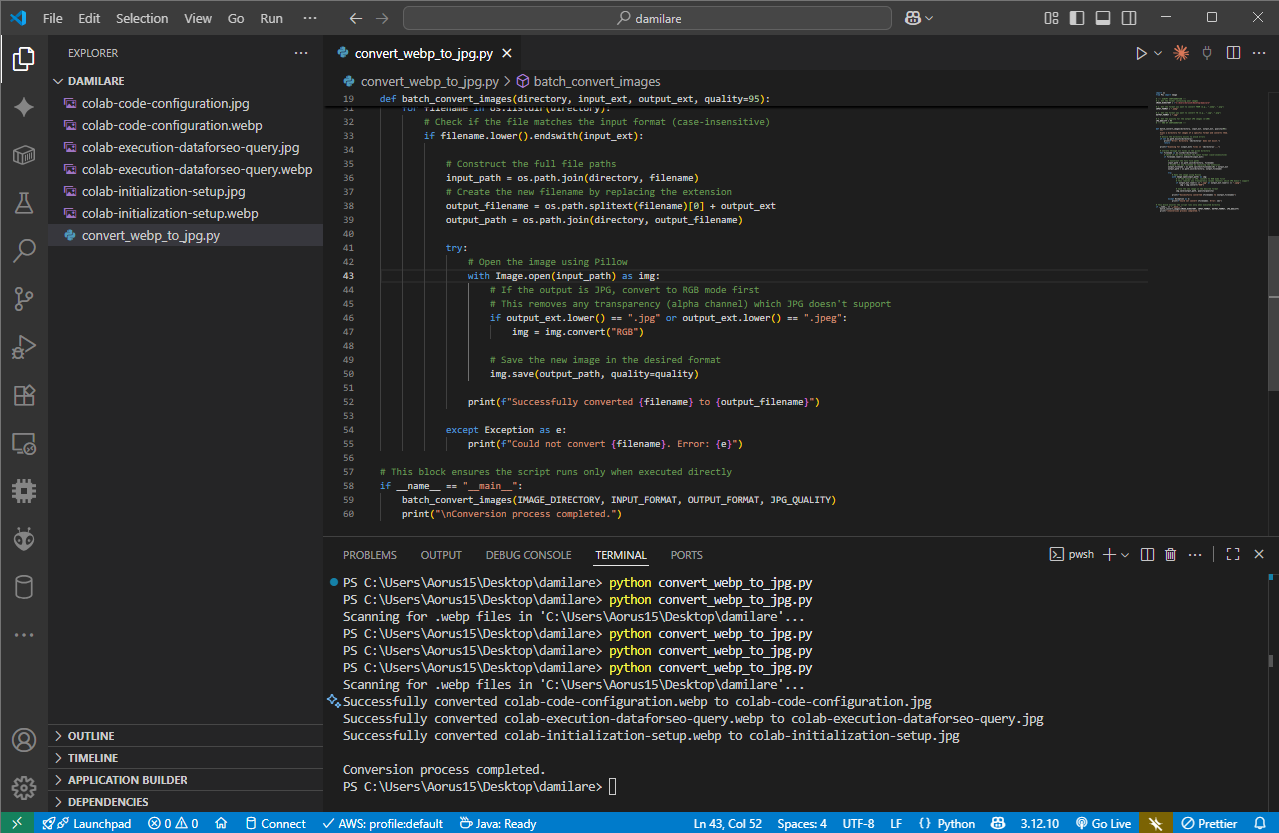Batch Image Format Converter: Automated Multi-Format Image Processing Tool
Python-Based Bulk Image Conversion Utility with Configurable Quality Settings and Format Flexibility
Tools & Technologies: Python, Pillow (PIL), OS Module, Cross-Platform Compatible
Status: Production-Ready & Actively Used
Project Overview
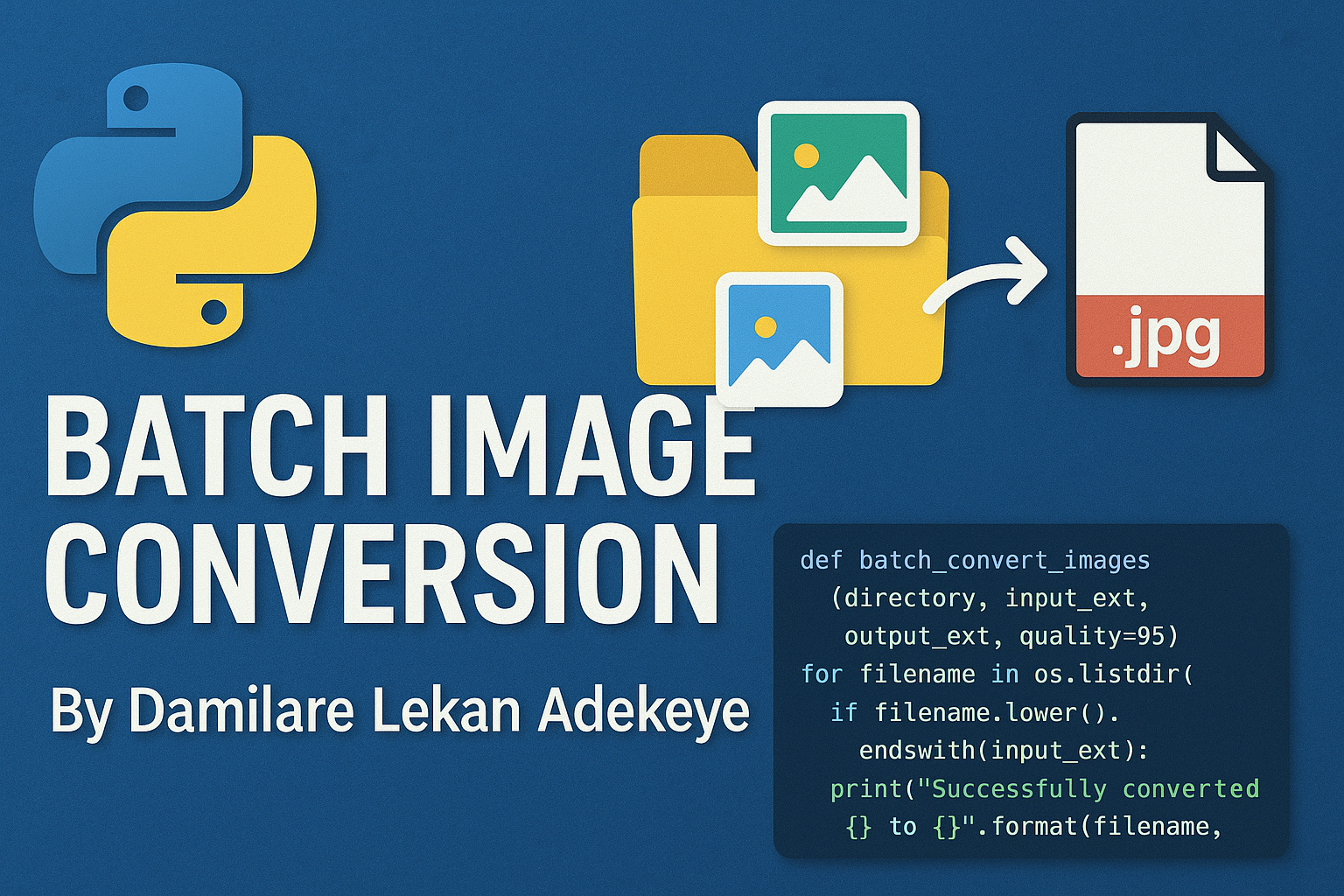
Batch Image Format Converter - Streamlining image format transformations with Python automation
Introduction
The Batch Image Format Converter is a powerful Python-based utility designed to streamline the process of converting multiple images between different formats. Built with efficiency and simplicity in mind, this tool addresses the common challenge of managing image assets across different platforms and applications that require specific image formats.
Leveraging the robust Pillow (PIL) library, the converter provides seamless transformation between popular image formats including WebP, PNG, JPG, and more. The tool features intelligent handling of format-specific requirements, such as automatic RGB conversion for JPEG outputs and configurable quality settings for optimized file sizes.
This implementation showcases practical automation skills, file system management, and image processing capabilities. The script's modular design and comprehensive error handling make it suitable for both personal use and integration into larger workflows, demonstrating proficiency in creating production-ready Python utilities.
Image Conversion Workflow
┌─────────────────┐ ┌──────────────┐ ┌─────────────────┐
│ Input Folder │────▶│ Python │────▶│ File Scanner │
│ Configuration │ │ Script │ │ (.webp files) │
└─────────────────┘ └──────────────┘ └─────────────────┘
│
▼
┌─────────────────┐ ┌──────────────┐ ┌─────────────────┐
│ Output Files │◀────│ Image Save │◀────│ Pillow (PIL) │
│ (.jpg format) │ │ w/ Quality │ │ Processing │
└─────────────────┘ └──────────────┘ └─────────────────┘
│
▼
┌─────────────────┐
│ RGB Convert │
│ (if needed) │
└─────────────────┘
Aim and Objectives
Aim:
To develop an efficient, user-friendly batch image conversion tool that
automates the process of converting multiple images between different formats while maintaining
quality and handling format-specific requirements.
Objectives:
- Create a configurable script that allows easy modification of input/output formats without code changes
- Implement robust error handling to gracefully manage corrupted or unsupported files
- Develop automatic format-specific processing (RGB conversion for JPEG compatibility)
- Provide quality control settings for optimizing output file sizes
- Design a modular, reusable function that can be integrated into larger projects
- Ensure cross-platform compatibility for Windows, macOS, and Linux systems
- Implement clear console output for progress tracking and error reporting
Key Features & Capabilities
Configurable Settings
Simple configuration section at the top of the script for easy customization of directories, formats, and quality settings
Batch Processing
Automatically processes all matching files in a directory with a single execution
Error Handling
Comprehensive exception handling ensures the script continues even if individual files fail
Format Intelligence
Automatic RGB conversion for JPEG outputs, removing transparency channels when necessary
Quality Control
Configurable quality settings (1-100) for optimizing file size vs. image quality trade-offs
Progress Feedback
Real-time console output showing conversion progress and any errors encountered
Configuration Parameters
The script provides a simple configuration section for easy customization:
| Parameter | Description | Example Value |
|---|---|---|
IMAGE_DIRECTORY |
Path to the folder containing images to convert | C:\Users\Aorus15\Desktop\damilare |
INPUT_FORMAT |
Source image format to convert from | .webp |
OUTPUT_FORMAT |
Target image format to convert to | .jpg |
JPG_QUALITY |
Quality setting for JPEG output (1-100) | 95 |
Technical Implementation
Core Algorithm
The conversion process follows these key steps:
- Directory Validation: Verifies the specified directory exists before processing
- File Discovery: Scans the directory for all files matching the input format (case-insensitive)
- Image Loading: Opens each image file using Pillow's Image.open() context manager
- Format Conversion: Applies format-specific transformations (RGB conversion for JPEG)
- Quality Optimization: Saves the converted image with specified quality settings
- Error Recovery: Catches and reports individual file errors without stopping the batch process
- Progress Reporting: Provides real-time feedback on conversion status
Supported Formats
The tool supports conversion between all formats supported by the Pillow library, including:
- WebP (Modern web format)
- JPEG/JPG (Universal compatibility)
- PNG (Lossless with transparency)
- BMP (Bitmap format)
- GIF (Animated/static)
- TIFF (High-quality printing)
- ICO (Icon files)
- And many more...
Usage Example
Here's a typical execution scenario converting WebP images to JPG format:
Scanning for .webp files in 'C:\Users\Aorus15\Desktop\damilare'... Successfully converted colab-code-configuration.webp to colab-code-configuration.jpg Successfully converted colab-execution-dataforseo-query.webp to colab-execution-dataforseo-query.jpg Successfully converted colab-initialization-setup.webp to colab-initialization-setup.jpg Conversion process completed.
The script processed three WebP images and successfully converted them to high-quality JPG format, maintaining a quality level of 95% while removing transparency channels for JPEG compatibility.
Complete Source Code
The full implementation of the Batch Image Format Converter:
import os
from PIL import Image
# --- SCRIPT CONFIGURATION ---
# 1. Set the folder containing your images
IMAGE_DIRECTORY = r"C:\Users\Aorus15\Desktop\damilare"
# 2. Set the format you want to convert FROM (e.g., ".webp", ".png")
INPUT_FORMAT = ".webp"
# 3. Set the format you want to convert TO (e.g., ".jpg", ".png")
OUTPUT_FORMAT = ".jpg"
# 4. Set the quality for the output JPG images (1-100)
JPG_QUALITY = 95
# --- END OF CONFIGURATION ---
def batch_convert_images(directory, input_ext, output_ext, quality=95):
"""
Scans a directory for images of a specific format and converts them.
Args:
directory (str): Path to the directory containing images
input_ext (str): File extension to convert from (e.g., ".webp")
output_ext (str): File extension to convert to (e.g., ".jpg")
quality (int): Quality setting for output images (1-100)
"""
# Ensure the directory exists to avoid errors
if not os.path.exists(directory):
print(f"Error: Directory '{directory}' does not exist.")
return
print(f"Scanning for {input_ext} files in '{directory}'...")
# Iterate through all files in the given directory
for filename in os.listdir(directory):
# Check if the file matches the input format (case-insensitive)
if filename.lower().endswith(input_ext):
# Construct the full file paths
input_path = os.path.join(directory, filename)
# Create the new filename by replacing the extension
output_filename = os.path.splitext(filename)[0] + output_ext
output_path = os.path.join(directory, output_filename)
try:
# Open the image using Pillow
with Image.open(input_path) as img:
# If the output is JPG, convert to RGB mode first
# This removes any transparency (alpha channel) which JPG doesn't support
if output_ext.lower() == ".jpg" or output_ext.lower() == ".jpeg":
img = img.convert("RGB")
# Save the new image in the desired format
img.save(output_path, quality=quality)
print(f"Successfully converted {filename} to {output_filename}")
except Exception as e:
print(f"Could not convert {filename}. Error: {e}")
# This block ensures the script runs only when executed directly
if __name__ == "__main__":
batch_convert_images(IMAGE_DIRECTORY, INPUT_FORMAT, OUTPUT_FORMAT, JPG_QUALITY)
print("\nConversion process completed.")Development Environment & Implementation
The following screenshots demonstrate the development process and execution of the Batch Image Format Converter:
Development Environment - VS Code
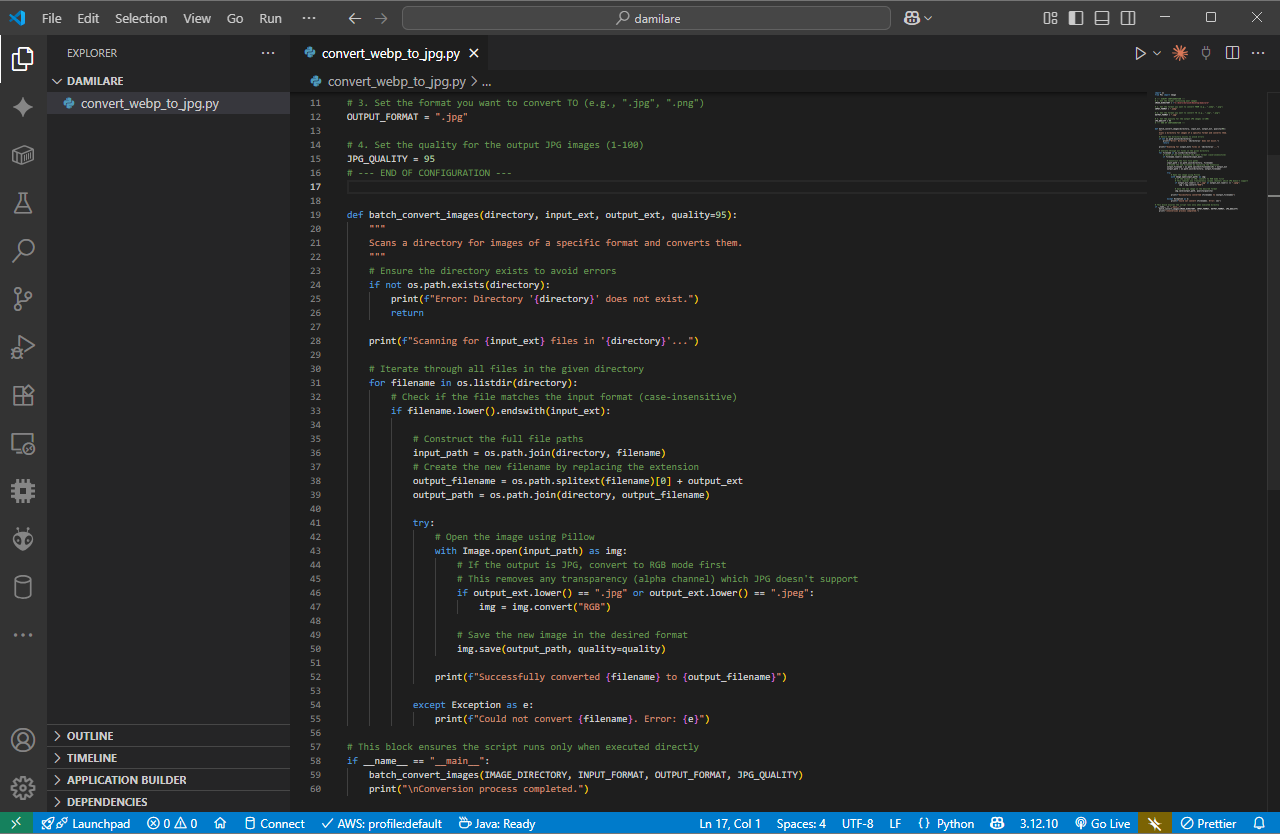
VS Code environment showing the main conversion script with configuration section and batch_convert_images function
Source Files Ready for Conversion
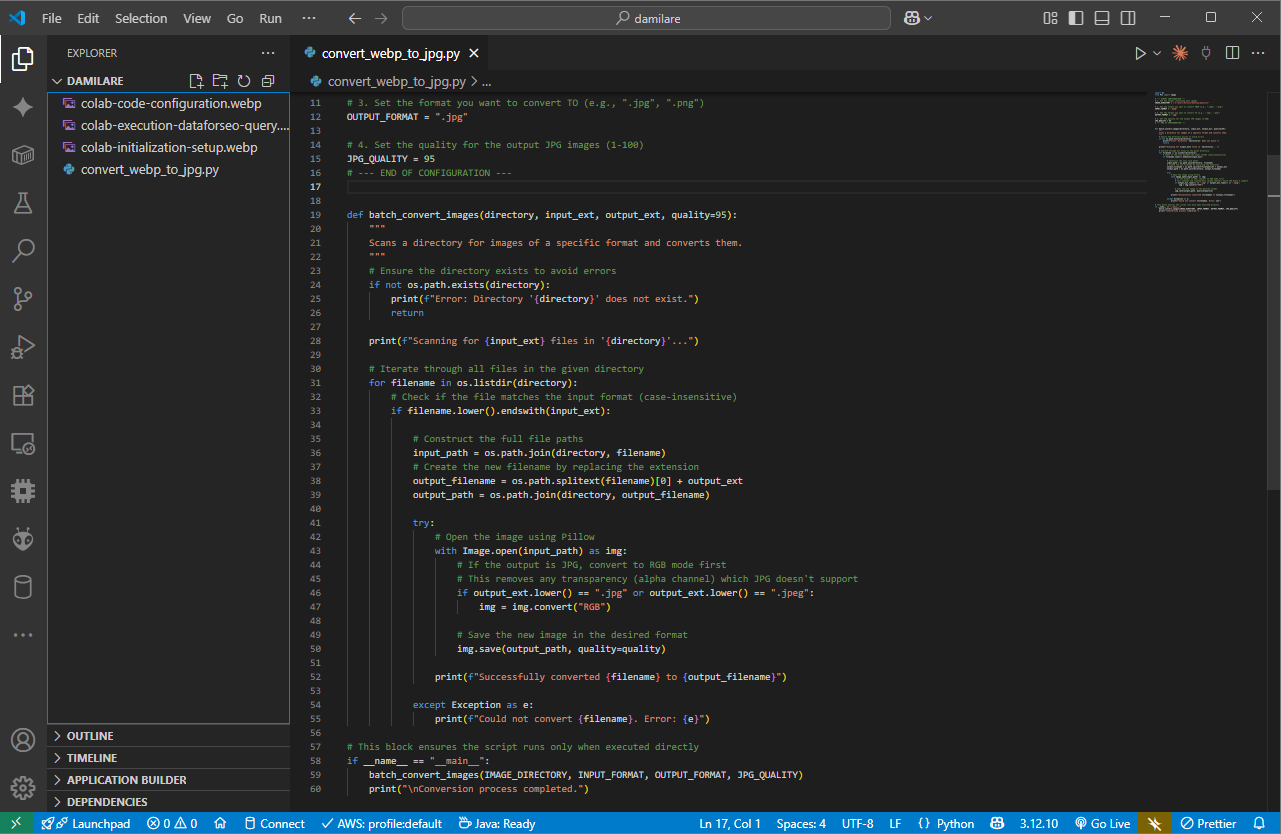
File explorer showing the original WebP files (colab-code-configuration.webp, colab-execution-dataforseo-query.webp, colab-initialization-setup.webp) ready for batch conversion
Terminal - Ready to Execute Script
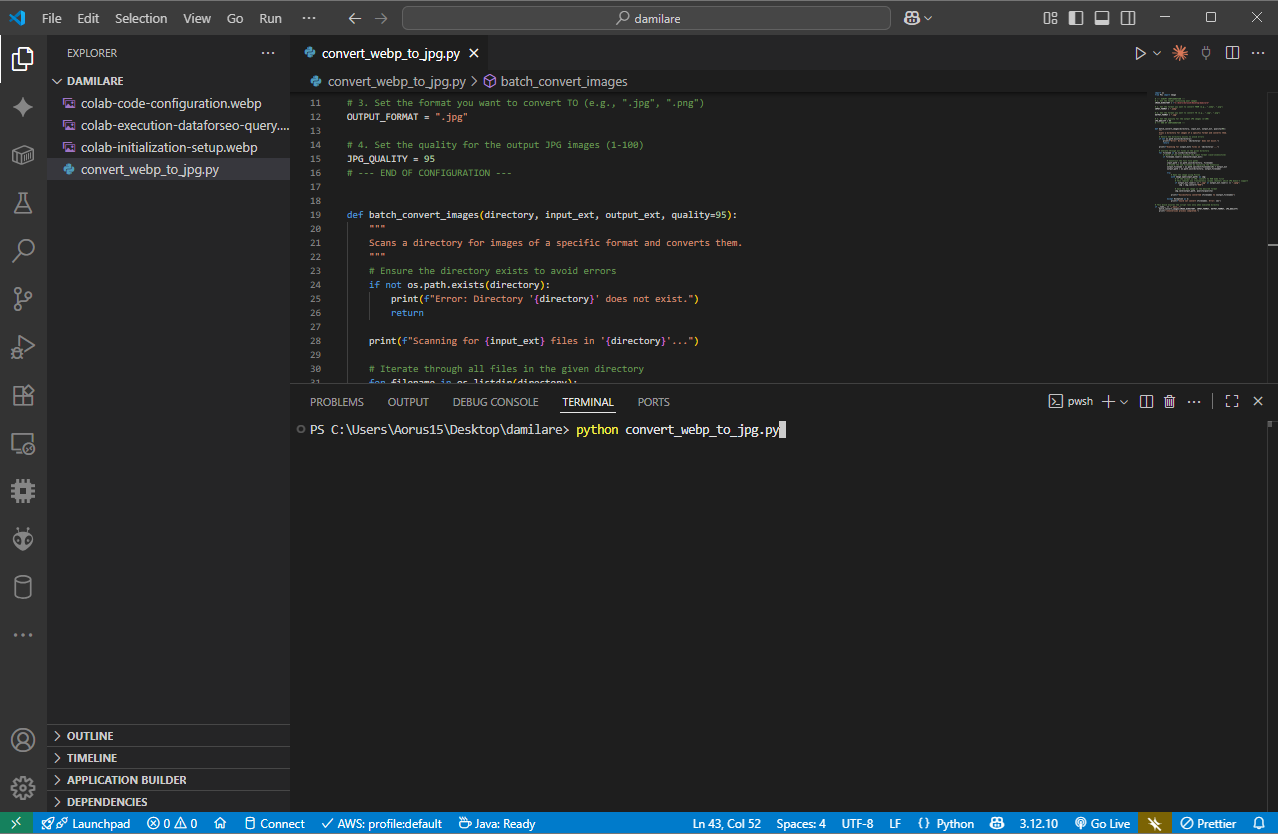
Terminal window showing the command: python convert_webp_to_jpg.py ready for execution
Use Cases & Applications
- Web Development: Converting modern WebP images to JPG/PNG for broader browser compatibility
- Content Management: Standardizing image formats across different platforms and CMS systems
- Storage Optimization: Converting lossless formats to compressed JPEG with controlled quality
- Archive Management: Batch converting legacy formats to modern standards
- E-commerce: Preparing product images in multiple formats for different marketplaces
- Documentation: Converting screenshots and diagrams to appropriate formats for technical documentation
- Social Media: Preparing images in platform-specific formats and quality requirements
Performance Characteristics
- Speed: Processes images as fast as disk I/O allows, typically 10-50 images per second depending on size
- Memory Efficiency: Uses context managers to ensure proper resource cleanup after each image
- Scalability: Can handle directories with thousands of images without memory issues
- Reliability: Individual file failures don't affect the overall batch process
- Cross-Platform: Works identically on Windows, macOS, and Linux systems
Technical Skills Demonstrated
- Python Programming: Clean, well-documented code following PEP 8 conventions
- Image Processing: Understanding of image formats, color spaces, and compression
- File System Operations: Efficient directory traversal and path manipulation
- Error Handling: Robust exception handling for production-ready code
- Library Integration: Effective use of third-party libraries (Pillow/PIL)
- User Experience: Clear configuration options and informative console output
- Documentation: Comprehensive inline comments and function docstrings
Future Enhancements
- Add GUI interface using Tkinter or PyQt for non-technical users
- Implement multi-threading for parallel processing of large batches
- Add image resizing and cropping options during conversion
- Create configuration profiles for common conversion scenarios
- Add metadata preservation options for EXIF data
- Implement recursive directory processing for nested folder structures
- Add command-line argument support for automation scripts
- Create logging system for detailed conversion reports
Installation & Setup
Requirements
- Python 3.6 or higher
- Pillow library (PIL fork)
Installation Steps
# Install Python (if not already installed) # Download from https://python.org # Install Pillow library pip install Pillow # Download the script # Save convert_webp_to_jpg.py to your desired location # Configure the script # Edit the configuration section with your paths and preferences # Run the script python convert_webp_to_jpg.py
Demonstration & Access
- GitHub Repository: View complete source code & documentation
- Download Script: Direct download link for the Python script
- Documentation: Detailed usage instructions and examples
Thank You for Exploring This Project
The Batch Image Format Converter demonstrates practical automation skills and attention to user experience in creating utility software. While seemingly simple, this tool showcases important software development principles including modularity, error handling, and user-friendly configuration.
This project reflects my approach to problem-solving: identifying common pain points and creating efficient, reliable solutions. The tool has proven valuable in various workflows, from web development to content management, saving hours of manual work through intelligent automation.
For inquiries about this project or to discuss custom automation solutions for your organization, please feel free to reach out via the Contact section. I'm always interested in creating tools that streamline workflows and improve productivity.
Best regards,
Damilare Lekan Adekeye
